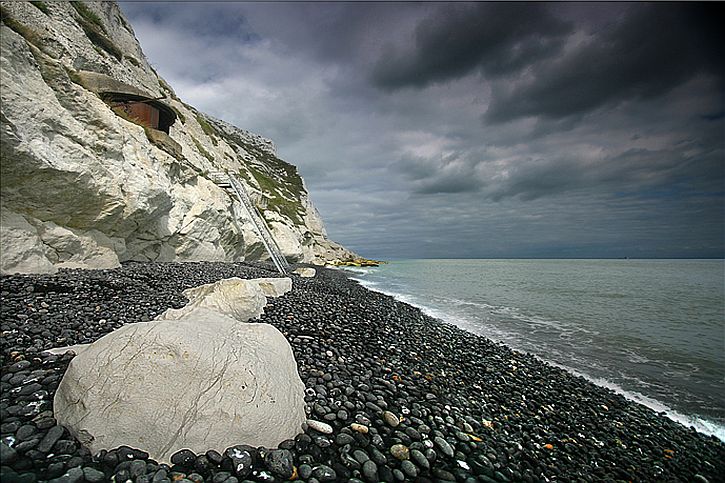
To listen to this reflection as a podcast, click here.
The memory of a visit to a rocky English shoreline inspired one of the 19th century’s most famous poems.
In Dover Beach, published in 1867, the British poet Matthew Arnold declares that belief in God is slowly but surely fading away. The old assurances about divine care in this world and blissful life in the next are receding, just as the waters of the ocean relentlessly disappear at low tide. He writes in the third stanza:
The Sea of Faith
Was once, too, at the full, and round earth’s shore
Lay like the folds of a bright girdle furled.
But now I only hear
Its melancholy, long, withdrawing roar,
Retreating, to the breath
Of the night-wind, down the vast edges drear
And naked shingles of the world.
After centuries of singing, praying, and cathedral-building, what remained of Christendom in Europe? Nothing but the “melancholy, long, withdrawing roar” of Christianity’s dying gasps.
A century earlier, some of the brightest lights of the Enlightenment had predicted this would happen. Reason would replace religion.
In 1710, Thomas Woolston – who was, of all things, an Anglican clergyman – asserted that every trace of the religion associated with Jesus would be gone from Europe by 1900. Voltaire was bolder still. The French philosophe predicted that Christianity would be just a memory by 1810. America’s third president, Thomas Jefferson, declared in 1822 that “there is not a young man now living in the United States who will not die a Unitarian” – that is, someone who might admire Jesus as a teacher or prophet but certainly not as the Son of God.
Even though churches, mosques, temples, and synagogues were still open for business in 1900, a majority of enlightened observers insisted that religion’s demise was just a matter of time.
German sociologist Max Weber asserted that secularism was bringing about the “disenchantment” of the universe. He meant that modern people now knew they could no longer believe in the supernatural. Sigmund Freud announced that Jesus had obviously been insane – who in their right mind would tell people to love their enemies? – and that psychoanalysis would cure humanity’s neurotic need for a heavenly Father.
Peter Berger, one of the world’s most highly regarded sociologists, told the New York Times in 1968 that virtually everyone in his field knew that secularism had rendered faith irrelevant. “By the 21st century, religious believers are likely to be found only in small sects, huddled together to resist a worldwide secular culture…”
National polls remind us every few years that faith is receding in America, just like the tide at Dover Beach. A Reuters headline a few years ago declared, “Poll Shows Those in U.S. Drifting Away from Religion.”
For a multitude of contemporary philosophers, sociologists, and historians, it’s become an article of faith (pun intended) that secularism has indeed triumphed – game, set, and match – over humanity’s long love affair with religion.
How, then, should we understand the opening line of sociologist Rodney’s Stark’s 2015 book, The Triumph of Faith? He writes, “The world is more religious than it has ever been.” Stark explores in depth the fact that while affiliation with organized religious groups has declined in a number of countries – this being the primary measuring stick in most of the religion-is-declining polls – belief in the supernatural remains pervasive, even in so-called secular Europe.
Right now there are more occult healers than doctors in Russia. Some 38% of French citizens believe in astrology. More than half of those who live in Iceland, often held up as one of the world’s most secular countries, believe in fairies. In Switzerland, 35% of adults agree that “some fortune tellers really can foresee the future.” There may be fewer Presbyterians these days in America, but a majority of the so-called Nones (as in, I belong to none of the classic religions) regularly pray and believe in angels. Nearly everyone in Japan makes sure to have a new car blessed by a Shinto priest. Even though 77% of respondents to a recent poll in China said they have no religion, almost all of them offer prayers and gifts in folk temples, seeking the blessing of invisible-world entities.
These may seem like unconventional beliefs and practices. But they demonstrate that human beings appear to be committed supernaturalists.
Stark writes, “The world is not merely as religious as it used to be. In important ways, it is much more intensely religious than ever before; indeed, it is far more churched… {t}emples, mosques, pagodas, chapels, and churches are full, and even most people who do not attend say they are religious.”
Peter Berger, for one, agrees. Thirty years after his famous statement to the New York Times he acknowledged, “I think what I and most other sociologists of religion wrote in the 1960s was a mistake… Most of the world today is certainly not secular. It’s very religious.”
Even if secular thinkers have declared the universe to be disenchanted, most of your neighbors think and act as if it is very enchanted, indeed.
Is there a biblical rejoinder to Matthew Arnold’s somber farewell to faith in Dover Beach?
It might be Habakkuk 2:14, which declares, “For the earth shall be filled with the knowledge of the glory of the Lord, as the waters cover the sea.”
The tide of faith, far from receding, appears to be rising on every human shore.
And it will be for the glory of God.
